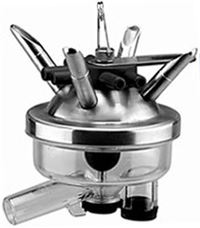Sulfones/Overview
Tough Transparent Polymers
Sulfones refer to three categories of polymers: polysulfone (PSU), Polyethersulfone (PES) and Polyphenylsulfone (PPSU), each of which has several grades and property sets.
Sulfones, amorphous thermoplastics, are tougher, stronger and more impact resistant than other transparent plastics, properties which are retained over time.
Hydrolytically stable, sulfones withstand prolonged exposure to water, chemicals and extreme temperatures (-40°C to 204°C) without degrading, making this class of polymers an excellent choice for medical and dental equipment.
Rigidity and dimensional integrity allow integration with steel components in assemblies for harsh environments (see box below).
Sulfone polymers are available in mineral-filled and glass-reinforced compounds, which provide improved strength, stiffness, and thermal stability.
Vivid, Long Lasting Colors
Transparent

Opaque

Polysulfone's natural color is light amber. Grades available in near water white.
1,000 Sterilization Cycles

Steam autoclaving is a primary sterilization method for medical devices. Temperatures typically range between 121°C to 134°C for 15 to 30 minutes.
Solvay Specialty Polymer's Radel PPSU is unique among amorphous thermoplastics in its ability to withstand more than 1,000 cycles of steam sterilization without any significant loss of properties.
Sulfones can be processed by injection molding, extrusion, and blow molding. Shapes can be machined for prototype evaluations.
Sulfones can handle virtually all post molding processes: ultrasonic welding, adhesive bonding, laser marking, heat staking, threading, and machining.
PESU and PPSU are inherently flame retardant.

An Illustration of Polysulfone's Properties
A milk collection manifold, which conveys milk from a cow’s udders to a stainless steel milk line, must meet a diverse set of challenges. Suspended from a 1200 pound cow, it can be kicked, twisted or dropped on the concrete (requiring modulus, tensile and impact strength).
Subjected to milk fat, Clean-in-Place (CIP) protocols utilizing alkaline detergents and acid rinses at 185° F, and left over night in a - 40° F Wisconsin dairy parlor, it needs chemical and temperature resistance and hydrolytic stability. Used up to 20 hours per day for years, it also must be reasonably priced and FDA approved. PSU meets these requirements on dairies around the world.


